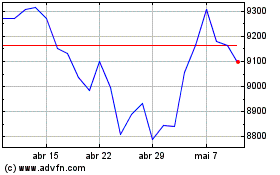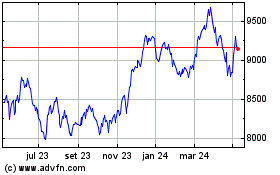By Simon Clark, Anna Isaac and Alexander Osipovich
The U.K. government could refuse to approve a potential $36.6
billion takeover of London Stock Exchange Group PLC by its Hong
Kong rival because it forms too critical a part of the country's
financial infrastructure, according to people familiar with the
matter.
Officials at the Bank of England, who informally advise the U.K.
Treasury, believe that the London Stock Exchange's clearing arm,
LCH constitutes crucial market plumbing, according to a person
familiar with the matter. This would make any tie-up unlikely to
successfully pass government scrutiny on concerns about financial
stability and security, they said.
"The London Stock Exchange is a critically important part of the
U.K. financial system, so as you would expect, the government and
the regulators will be looking at the details closely," a
spokesperson for the U.K. Treasury said. "We cannot comment further
on commercial matters."
U.S. regulators will also have a say in whether a deal can
proceed if the offer gains traction.
Hong Kong Exchanges & Clearing Ltd. made an unsolicited
offer Wednesday in an attempt to thwart London Stock Exchange's
$14.5 billion takeover of financial-information provider Refinitiv
Holdings Ltd. LSE said it remains committed to the Refinitiv
deal.
The London exchange has hundreds of U.S. employees and operates
businesses that are regulated by the Securities and Exchange
Commission, the Commodity Futures Trading Commission and the
Financial Industry Regulatory Authority.
The Committee on Foreign Investment in the U.S., which
scrutinizes politically sensitive takeovers, would also likely have
a say.
"Cfius has jurisdiction," said Nova Daly, a policy adviser at
Washington law firm Wiley Rein LLP who previously ran the Cfius
process as deputy assistant secretary at the Treasury Department. A
Cfius spokesman declined to comment.
Takeovers of stock exchanges are often fraught with political
and regulatory obstacles. Germany's Deutsche Boerse AG, Nasdaq Inc.
and Sweden's OM Group have all made failed bids for the London
exchange. The Hong Kong exchange could also face significant
hurdles, particularly at a time of fractious geopolitics dominated
by a trade war between the U.S. and China.
"Once you go cross-border, generally, you get many people asking
all kinds of questions like who's running the company, what's the
board structure and, of course, the national aspect behind the
company," said Brad Bailey, research director for capital markets
at Celent in New York. "There would be a lot of mixed feelings
around what would happen should a deal happen."
The London exchange has U.S. employees in "major hubs" in New
York City, Fort Mill, S.C., Buffalo, N.Y., and Seattle, a
spokeswoman said. The CFTC and SEC regulate its LCH SA unit, the
CFTC regulates its LCH Ltd. unit and the SEC and Finra regulate its
MTS Markets unit, the spokeswoman said.
"There will be significant U.S. government concern about the
security of data and influence of capital flows that could result
from the transaction," said a senior Washington lawyer who
specializes in Cfius cases.
The history of the exchange business over the past decade is
riddled with failed cross-border deals. Many of these were blocked
by regulators out of concerns that a prized national asset would be
taken over by foreigners, or that the takeover would give the
combined company monopolistic pricing power in crucial financial
markets.
In 2017, the European Union blocked a proposed tie-up between
Deutsche Börse and London Stock Exchange, ending an effort to
create a pan-European exchange champion. EU regulators rejected the
deal on antitrust grounds, but the deal was also roiled by
Britain's vote to exit from the EU just a few months after the deal
was agreed.
In 2012, the EU rejected an $18.1 billion merger between
Deutsche Börse and NYSE Euronext, which was then the parent company
of the New York Stock Exchange, also on antitrust grounds.
In 2011, London Stock Exchange agreed to merge with Canada's TMX
Group, the operator of Canada's flagship Toronto Stock Exchange, in
a bid to become a trans-Atlantic exchange group. But that deal
foundered after a homegrown, competing bid emerged from a group of
Canadian banks and asset managers. The group, which dubbed
themselves Maple Group Acquisition Corp. in an allusion to the
Canadian flag, ultimately took control of TMX.
Also in 2011, authorities in Australia blocked a proposed
takeover of ASX, that country's main stock-market operator, by
Singapore Exchange Ltd. Canberra said the $8.9 billion deal offered
little for the resource-rich Pacific nation and raised the risk of
Australia losing control of its clearing and settlement
systems.
Even deals within the same country can face a steep hurdle in
clearing antitrust review. In 2011, the U.S. Justice Department
killed an effort by Nasdaq to take over the NYSE, saying it would
lead to too much concentration in the U.S. stock-exchange
business.
Steven Russolillo
contributed to this article.
Write to Simon Clark at simon.clark@wsj.com, Anna Isaac at
anna.isaac@wsj.com and Alexander Osipovich at
alexander.osipovich@dowjones.com
(END) Dow Jones Newswires
September 11, 2019 15:52 ET (19:52 GMT)
Copyright (c) 2019 Dow Jones & Company, Inc.
London Stock Exchange (LSE:LSEG)
Gráfico Histórico do Ativo
De Mar 2024 até Abr 2024

London Stock Exchange (LSE:LSEG)
Gráfico Histórico do Ativo
De Abr 2023 até Abr 2024
